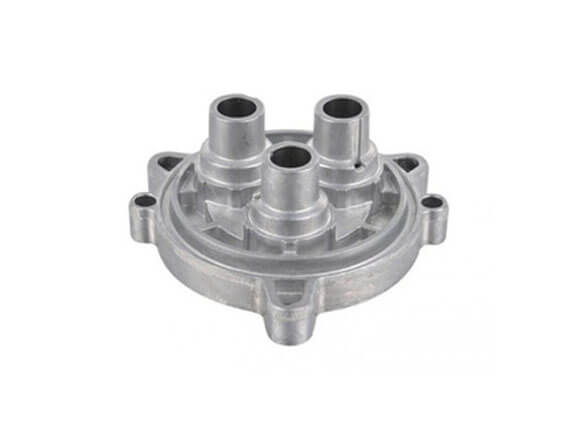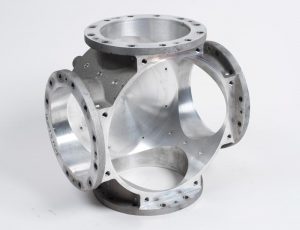Exactly How Light Weight Aluminum Casting Adds To Effective Manufacturing Solutions
Aluminum spreading plays a crucial function in modern production. Its lightweight nature and corrosion resistance make it a favored selection for numerous industries. Techniques such as die casting and sand spreading enable the development of elaborate parts with very little waste. The integration of automation further enhances manufacturing efficiency. The effects of these innovations expand past simple performance - Aluminum Foundry. Comprehending the broader effect exposes considerable insights into the future of production
The Benefits of Light Weight Aluminum in Production
Although various metals are utilized in manufacturing, light weight aluminum stands out due to its special residential properties that enhance production effectiveness and product performance. Its light-weight nature especially reduces transportation prices and power requirements in different applications. Light weight aluminum's outstanding corrosion resistance assurances durability and durability, minimizing the need for regular substitutes and maintenance. This metal can be easily built and formed, permitting versatile layout options that fulfill certain market needs. On top of that, aluminum shows exceptional thermal and electrical conductivity, making it an excellent option for applications needing efficient heat dissipation and electric monitoring. The recyclability of light weight aluminum additionally plays an important duty in lasting manufacturing practices, as it can be reused without shedding its integral properties. In general, the advantages of light weight aluminum in producing result in cost savings, improved item long life, and a minimized environmental impact, making it a favored product in countless industries.
Trick Light Weight Aluminum Casting Techniques
Aluminum casting methods are crucial for creating high-quality components in different producing processes. The primary techniques include sand spreading, die spreading, and investment spreading. Sand spreading entails developing a mold from sand, which allows for large parts and intricate shapes. This method is commonly preferred for its cost-effectiveness and flexibility. Die spreading, on the various other hand, utilizes high-pressure to infuse liquified aluminum into steel mold and mildews, resulting in accurate, consistent parts appropriate for high-volume production. Investment casting uses exceptional surface area finish and detailed detail by making use of a wax pattern that is disappeared to form the mold. Each of these strategies has details applications and advantages, permitting manufacturers to select the most appropriate approach based on aspects like manufacturing complexity, material, and volume specifications. By comprehending these key techniques, suppliers can improve their manufacturing efficiency and guarantee the integrity of their aluminum components.
Effect On Automotive Industry
As the automobile industry increasingly focuses on lightweight products to enhance fuel efficiency and performance, light weight aluminum spreading has emerged as a crucial option. This production procedure enables automakers to create complex components with lowered weight without endangering architectural stability. By utilizing light weight aluminum casting, makers can develop parts such as engine blocks, transmission real estates, and suspension parts that are not only lighter but also show superb thermal conductivity and deterioration resistance.
Furthermore, the convenience of light weight aluminum spreading strategies allows the manufacturing of complex designs, helping with development in lorry aesthetic appeals and capability. As cars become much more technologically progressed, the capability to incorporate features like innovative safety and security systems and electrical drivetrains ends up being important.

Aerospace Applications of Aluminum Casting
Light weight aluminum spreading plays a crucial role in aerospace applications by enabling the production of light-weight architectural parts that improve gas efficiency. In addition, the accuracy of light weight aluminum casting enables the creation of elaborate engine parts, which are crucial for peak performance and integrity. This mix of light-weight products and specific design positions light weight aluminum casting as a crucial innovation in the aerospace industry.
Light-weight Architectural Elements
In the quest for boosted performance and effectiveness in aerospace applications, lightweight structural components have come to be progressively essential. Light weight aluminum spreading plays a pivotal role in this undertaking, supplying suppliers with the capability to produce parts that are both strong and light-weight. The reduced density of aluminum enables considerable weight decreases without jeopardizing structural honesty, which is crucial for aircraft performance and gas effectiveness. On top of that, light weight aluminum castings can be crafted to satisfy particular layout needs, enabling the development of intricate geometries that typical manufacturing methods may battle to attain. This flexibility not just improves manufacturing procedures however additionally contributes to total expense financial savings. As the aerospace industry remains to emphasize sustainability, the demand for light-weight aluminum components is anticipated to increase, better progressing technology in production.
Accuracy Engine Components
Manufacturers progressively count on aluminum spreading to generate accuracy engine parts for aerospace applications, driven by the material's distinct properties. Light weight aluminum's lightweight nature considerably decreases overall airplane weight, enhancing gas effectiveness and efficiency. Its outstanding deterioration resistance guarantees longevity in severe environments, making it perfect for crucial engine components. Additionally, light weight aluminum casting enables limited resistances and detailed designs, vital for enhancing engine performance and dependability. The casting procedure also supports automation, allowing makers to fulfill high demand while maintaining high quality requirements. As aerospace technology remains to development, the role of aluminum casting in creating precision engine parts will be essential in attaining higher effectiveness and innovation in aircraft layout and functionality.
Sustainability and Ecological Benefits
The growing focus on sustainability in production has placed light weight aluminum casting as a leading service for environmentally mindful manufacturing. This procedure utilizes recycled light weight aluminum, which considerably decreases power usage compared to main light weight aluminum manufacturing. By leveraging scrap metal, makers can lower their carbon footprint and lessen waste, aligning with worldwide sustainability objectives.
Furthermore, light weight aluminum casting creates less unsafe emissions, adding to a cleaner atmosphere. The lightweight nature of light weight aluminum also boosts gas efficiency in transport applications, better advertising environmentally friendly practices.
The toughness and corrosion resistance of aluminum lead to longer product life-spans, decreasing the need for regular substitutes and preserving sources. As markets progressively focus on sustainable choices, aluminum spreading stands apart as an innovative technique that not just satisfies manufacturing needs but likewise sustains ecological stewardship. This commitment to sustainability settings light weight aluminum casting as a critical player in the shift towards a greener manufacturing landscape.
Price Effectiveness in Production
Price effectiveness is a considerable advantage of aluminum spreading, complementing its sustainability benefits - Aluminum Foundry. The process of light weight aluminum casting permits the manufacturing of complex forms with minimal waste, which is specifically crucial in an affordable production environment. Using aluminum decreases power costs, as it has a lower melting factor contrasted to various other steels, bring about reduced power consumption during manufacturing
In addition, light weight aluminum's light-weight homes contribute to reduce shipping and managing prices, even more boosting total expense effectiveness. The longevity and rust resistance of aluminum actors products likewise mean that they require less maintenance and replacement in time, resulting in long-lasting cost savings for suppliers.
Advancements in casting technologies, such as boosted mold layouts and automation, have streamlined production processes, decreasing labor costs and enhancing result effectiveness. Overall, cost effectiveness in aluminum casting plays an essential function in optimizing production operations and supporting competitive prices techniques.
Future Trends in Aluminum Casting
The future of aluminum spreading is progressively formed by developments in automation and sustainable material innovations. Automation technologies are expected to boost effectiveness and precision in the spreading process, while more info lasting methods intend to minimize ecological influence. With each other, these patterns promise to redefine production standards and techniques within the aluminum spreading sector.
Automation in Light Weight Aluminum Spreading
Embracing automation is transforming aluminum casting processes, leading the way for improved efficiency and accuracy. Automated systems simplify manufacturing by minimizing human treatment, lowering mistakes, and increasing throughput. Technologies such as robot arms and computer numerical control (CNC) devices permit accurate and regular shaping of aluminum components. In addition, wise sensors keep track of various specifications in genuine time, making certain suitable problems throughout the casting procedure. This combination of automation not only reduces lead times yet also enhances product top quality by maintaining tighter resistances. As suppliers increasingly adopt these advanced technologies, the aluminum spreading industry is set to experience considerable enhancements in functional efficiency, cost-effectiveness, and competitiveness in the worldwide market.
Sustainable Product Innovations

Frequently Asked Questions
What Sorts Of Light Weight Aluminum Alloys Are Generally Used in Spreading?
Commonly used aluminum alloys in casting consist of 356, 380, and 413. These alloys are favored for their excellent fluidity, stamina, and deterioration resistance, making them ideal for a variety of commercial applications.
How Does Aluminum Casting Contrast to Various Other Metal Casting Approaches?
Aluminum casting normally offers reduced weight, remarkable deterioration resistance, and better thermal conductivity contrasted to various other steel spreading methods. Furthermore, it enables complex styles and faster manufacturing cycles, improving general manufacturing effectiveness and performance.
What Industries Benefit A Lot Of From Light Weight Aluminum Spreading?
The auto, aerospace, and electronic devices sectors profit most from light weight aluminum casting. These sectors utilize its lightweight, corrosion-resistant residential or commercial properties to improve performance, reduce fuel consumption, and improve general item efficiency, making light weight aluminum spreading increasingly essential.
Exist Certain Style Limitations With Aluminum Casting?
Yes, aluminum spreading has design restrictions, consisting of limitations on wall thickness, complicated geometry difficulties, and possible issues with achieving tight tolerances (Precision aluminum casting). These variables can affect the overall toughness and capability of the final product
Exactly How Is Quality Assurance Maintained in Aluminum Casting Processes?
Quality assurance in aluminum casting processes is kept via strenuous evaluations, adherence to standard treatments, and using sophisticated technologies. Routine monitoring warranties dimensional accuracy, surface honesty, and product uniformity throughout manufacturing, promoting total integrity.
As the automotive industry increasingly focuses on lightweight products to improve gas efficiency and performance, aluminum spreading has emerged as an essential option. Aluminum spreading plays a critical function in aerospace applications by making it possible for the manufacturing of lightweight structural elements that enhance fuel effectiveness. Expense efficiency is a substantial benefit of light weight aluminum spreading, complementing its sustainability benefits. Embracing automation is transforming aluminum spreading procedures, paving the means for boosted efficiency and accuracy. Recycled light weight aluminum usage has actually obtained grip, significantly decreasing power usage compared to key aluminum manufacturing.